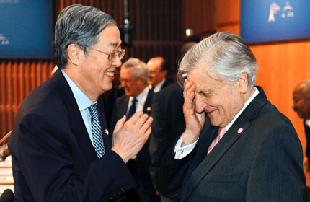G20 settles for compromise in deal
-
- Shanghai Daily, February 21, 2011
|

|
|
European Central Bank President Jean Claude Trichet (right) gestures as he talks with China's central bank Governor Zhou Xiaochuan at the opening of the G20 finance summit in Paris on Saturday. Finance chiefs from the world's 20 industrialized and fastest developing nations discuss the world economy at the two-day meeting. |
The world's dominant economies struck a watered down deal on how to smooth out trade and currency imbalances many say exacerbated the financial crisis, but the difficulty in getting vastly different economies like China and the United States on the same page doesn't bode well for the Group of 20 rich and developing countries.
G20 finance ministers anwd central bankers meeting in Paris agreed on Saturday on a list of technical indicators to track those imbalances - caused by some countries consuming more while others tend to hold on to their money - but left the more tricky questions of when those imbalances actually become dangerous and what to do to mitigate them for later.
French Finance Minister Christine Lagarde, whose country holds the G20 presidency this year, said the all-night talks had been "tense" at times, indicating the clash in national interests between countries that find themselves on completely divergent growth trajectories after the 2008 financial crisis that plunged the world into its worst economic recession in 70 years.
The result was a "balanced compromise (that) doesn't stigmatize any one country," Lagarde told journalists.
The G20 itself is a recognition of the rise to power of nations such as India, China and Brazil, having supplanted smaller forums like the G7 and G8 during the climax of the financial crisis, when it achieved its biggest successes.
But since then with some countries growing at an almost unprecedented pace while others remain in the trough of recession the G20 has lost much of its swagger.
At the heart of the debate about imbalances is the realization that a decades-long global economic order centered on the US buying exports from the rest of the world and running huge trade deficits, while countries such as Germany accumulate vast surpluses, is no longer tenable.
In the years before the meltdown, countries with trade surpluses plowed money into mortgage and other investments in the US, driving up their value and exacerbating the crash when the bubble eventually burst.
But the opaque language of Saturday's deal shows the challenge of moving beyond that basic recognition.
Compromise wording was agreed on making that measurement a mix of current account balance - the indicator most countries wanted - and trade balance, the yardstick China had been pushing for.
The valuation of national currencies - long a sticking point in Chinese-US relations - did not survive as a separate indicator, but will be considered as part of the broader analysis of capital flows.
Foreign currency reserves were dropped all together, although some officials insisted they survived under the oblique heading of "other policies."
Lagarde touted the very fact the words "exchange rate" were even mentioned on the list as a success. The indicators also include more traditional yardsticks such as public debt, deficits, private debt levels and savings rates.
主站蜘蛛池模板:
hdmaturetube熟女xx视频韩国|
国产主播一区二区|
久久久无码精品亚洲日韩蜜桃|
欧美美女视频网站|
免费无码一区二区三区蜜桃大
|
日韩a级毛片免费观看|
亚洲人成网站999久久久综合|
正在播放国产精品|
伊人蕉久中文字幕无码专区|
91成人午夜性a一级毛片|
国产精品密蕾丝视频|
一级黄色免费大片|
无翼乌全彩之大雄医生|
久久婷婷人人澡人人爱91|
澳门特级毛片免费观看|
免费无码成人AV片在线在线播放|
老婆~我等不及了给我|
国产人妖另类在线二区|
337p中国人体啪啪|
在公交车上弄到高c了漫画|
jizz日本免费|
好硬好湿好大再深一点动态图|
中国一级特黄的片子免费
|
免费A级毛片无码A∨|
精品久久久无码人妻中文字幕|
国产特级毛片aaaaaa高潮流水|
91福利小视频|
成人免费高清完整版在线观看|
久久不见久久见免费影院www日本
久久不见久久见免费影院www日本
|
中文字幕在线网|
欧美kkk4444在线观看|
亚洲成aⅴ人片在线观|
欧美黑人又粗又大又爽免费|
亚洲高清在线mv|
田中瞳中文字幕久久精品|
免费精品无码AV片在线观看|
精品无码成人片一区二区98|
后入内射欧美99二区视频|
久久伊人色综合|
在线观看精品视频看看播放
|
99久热只有精品视频免费看|
